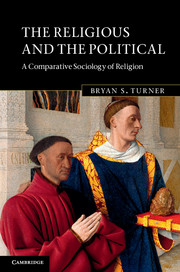Introduction
Published online by Cambridge University Press: 05 April 2013
Summary
Religion and politics are two fundamental dimensions of human society, and yet they are often at loggerheads. Religion appears to belong to a different realm, signifying matters that are permanent and enduring, residing beyond the everyday. Politics appears to involve the secular struggle for power and influence, being driven by interest. I use this verb (to appear) because in fact religion and politics are almost inevitably entwined and they are both deeply concerned with the control or regulation of everyday affairs. Max Weber at the very beginning of The sociology of religion (1966b) said that religion is fundamentally concerned with the things of this world such as health and wealth. He went on to argue that politics inevitably involves power and violence, but that religion (at least organized forms of religion) also involves symbolic violence. Excommunication would be one obvious example of symbolic violence. These claims may not appear to be immediately self-evident, since surely religion also involves the gentle cultivation of the soul, while politics involves the development of the citizen in the public domain. Weber’s sociology is ultimately tragic because religion as a universal ethic of brotherly love is inevitably at odds with ‘the world’, and religion is almost always compromised or defeated by the forces of this world.
In classical thought this relationship between politics and religion was analysed in terms of an important distinction between state-craft and soul-craft. The Good Society required both a successful management of public affairs through the wise leadership of the state and an inner discipline of the citizen to harness passion and to direct interest for the public good. In the modern world we are in danger of losing both. With the growth of the mass media in electoral democracies, politicians are driven by the need for high ratings in opinion polls, and seek celebrity rather than wisdom. We judge them in terms of their performance in economic terms such as the rate of unemployment, and rather less in terms of their religious beliefs and their moral standing. Their policies are typically short term, because in democracies they need to win elections, and hence their political tactics are often based on the findings of the most recent focus groups rather than on the long-term needs of society.
- Type
- Chapter
- Information
- The Religious and the PoliticalA Comparative Sociology of Religion, pp. 1 - 16Publisher: Cambridge University PressPrint publication year: 2013



